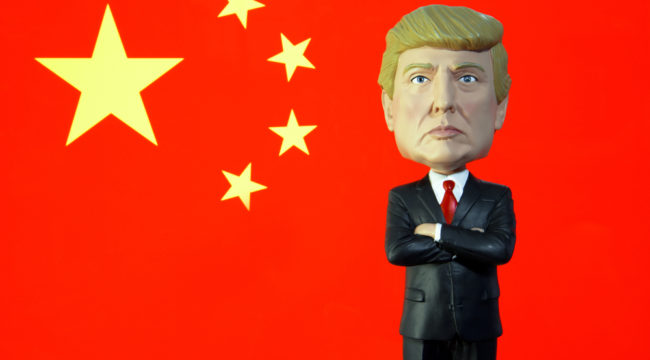 Tariffs: As American As Apple Pie
Tariffs: As American As Apple Pie

By James Rickards
Posted
May 15, 2019
Tariffs: As American As Apple Pie
Listening to hysterical commentary from the mainstream media about President Trump’s tariffs, one would think his policies were in violation of the U.S. Constitution. Nothing could be further from the truth.
America grew rich and powerful from 1787–1962, a period of 175 years, using tariffs, subsidies and other barriers to trade to nurture domestic industry and protect high-paying manufacturing jobs.
In fact, tariffs are as American as apple pie.
Trump is using the same basic playbook that predominated in U.S. policy from George Washington forward. Washington’s secretary of the Treasury, Alexander Hamilton, drafted a report to Congress called the Report on Manufactures presented in 1791. Hamilton proposed that in order to have a strong country, America needed a strong manufacturing base with jobs that taught skills and offered income security.
To achieve this, Hamilton proposed subsidies to U.S. businesses so they could compete successfully against more established U.K. and European businesses.
These subsidies might include grants of government land or rights of way, purchase orders from the government itself or outright payments. This was a mercantilist system that encouraged a trade surplus and the accumulation of gold reserves.
Hamilton’s plan was later proposed on a broader scale by Kentucky Sen. Henry Clay. This new plan began with the Tariff of 1816. Clay’s plan was called the American System. Abraham Lincoln adopted the American System as his platform in the election of 1860, and it became a bedrock principle of the new Republican Party.
The 19th and early 20th centuries were a heyday of the American System. This period was characterized by enormous economic growth and population expansion by the U.S. The American System was also accompanied mostly by low inflation or even deflation (which increases the purchasing power of everyday citizens) despite occasional financial panics and some inflation during the Civil War.
Trump is simply returning to that tradition.
Against this mercantilist system was a theory of free trade based on comparative advantage as advocated by British economist David Ricardo in the early 19th century. Ricardo’s theory said that trading nations are endowed with attributes that gave them a relative advantage in producing certain goods versus others.
These attributes could consist of natural resources, climate, population, river systems, education, ports, financial capacity or any other factor of production. Nations should produce those goods as to which they have a natural advantage and trade with other nations for goods where the advantage was not so great.
Countries should specialize in what they do best, and let others also specialize in what they do best. Then countries could simply trade the goods they make for the goods made by others. All sides would be better off because prices would be lower as a result of specialization in those goods where you have a natural advantage.
It’s a nice theory often summed up in the idea that Tom Brady should not mow his own lawn because it makes more sense to pay a landscaper while he practices football.
For example, if the U.K. had an advantage in textile production and Portugal had an advantage in wine production, then the U.K. and Portugal should trade wool for wine.
But if the theory of comparative advantage were true, Japan would still be exporting tuna fish instead of cars, computers, TVs, steel and much more.
The same can be said of the globalists’ view that capital should flow freely across borders. That might be advantageous in theory but market manipulation by central banks and rouge actors like Goldman Sachs and big hedge funds make it a treacherous proposition.
The problem with this theory of comparative advantage is that the factors of production are not permanent and they are not immobile.
If labor moves from the countryside to the city in China, then suddenly China has a comparative advantage in cheap labor. If finance capital moves from New York banks to direct foreign investment in Chinese factories, then China has the comparative advantage in capital also.
Before long, China has the advantage in labor and capital and is running huge trade surpluses with the U.S., putting Americans out of work and shutting down U.S. factories in the process.
Worse yet, countries such as China can pull comparative advantage out of thin air with government subsidies, exactly as Hamilton proposed 227 years ago. The most famous example of this is Taiwan Semiconductor.
In the 1970s, Taiwan had no comparative advantage in semiconductor production. But with government subsidies to a national champion, today Taiwan Semiconductor is the largest supplier of semiconductors in the world.
When did the U.S. abandon the system that worked so well for so long?
Beginning in 1962, the U.S. turned its back on a successful legacy of protecting its jobs and industry and embraced the free trade theory. This was done first through the General Agreement on Tariffs and Trade, or GATT, one of the original Bretton Woods institutions in addition to the World Bank and IMF.
Beginning in 1995, the World Trade Organization, WTO, displaced GATT and has been the main venue for U.S. free trade policy ever since. China became a member of WTO on Dec. 11, 2001, but has notoriously broken many WTO rules since joining.
The globalist approach might work if everyone were a free trader and no one resorted to tariffs, subsidies, nontariff barriers to trade and theft of intellectual property. Unfortunately, that’s not the world we live in.
We live in a world where the U.S. is a free trade sucker and everyone else breaks the rules. In a world where a few parties are free traders but most are mercantilists, the mercantilists win every time. They are like parasites sucking the free traders dry.
If open trade, and open capital flows are flawed ideas, why do elites support them?
The switch in U.S. policy from quasi-mercantilism to free trade was driven partly by academics who embrace the simple version of free trade without understanding the flaws (exemplified by China and Taiwan).
Others understand the flaws in free trade well enough but value the world at large over the U.S. Their agenda is to diminish the power of the United States, and the U.S. dollar, in world affairs and to enhance the power of rising nations especially China.
If several hundred million Chinese can be pulled from poverty by leaving the U.S. market open while China subsidies its companies, imposes its own tariffs, steals intellectual property, and limits U.S. foreign direct investment, then that’s fine. If U.S. workers lose their jobs in the process, that’s fine too.
The globalists consider that a form of progress toward their “one world” utopia. They don’t care about the U.S.; they only care about their “one world” vision.
Globalists are often supported by major international firms in the pharmaceutical and other businesses that profit from global supply chains even as Americans lose their jobs.
But Trump is a thorn in the globalists’ side. Trump focuses on restoring lost U.S. jobs even if the cost to China is high. That’s China’s problem, not ours. Trump’s policy is “America First,” and he means it.
Now the battle is heating up again. Whoever wins the war of the globalists versus the nationalists could decide the world system for decades to come.
Regards,
Jim Rickards
for The Daily Reckoning
https://dailyreckoning.com/tariffs-a...-as-apple-pie/
Europe used to have empires. They were run by emperors.
Then we had kingdoms. They were run by kings.
Now we have countries...





 Reply With Quote
Reply With Quote